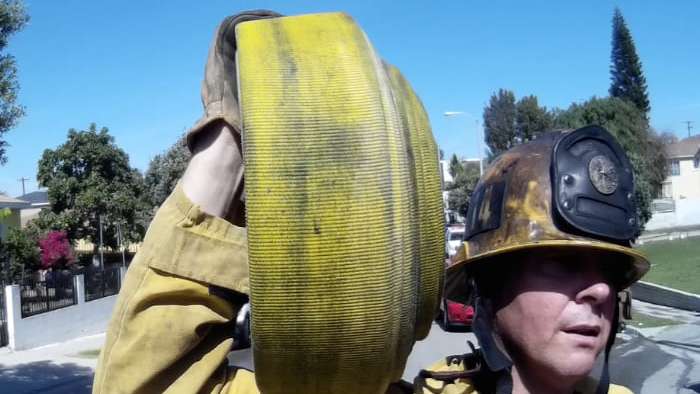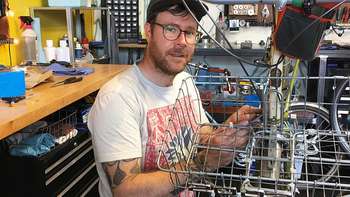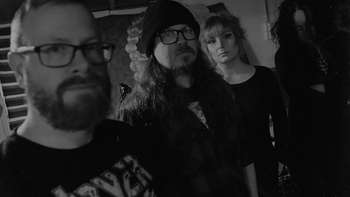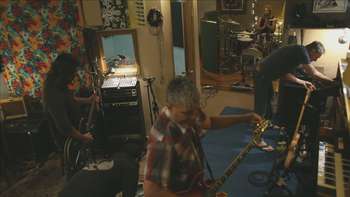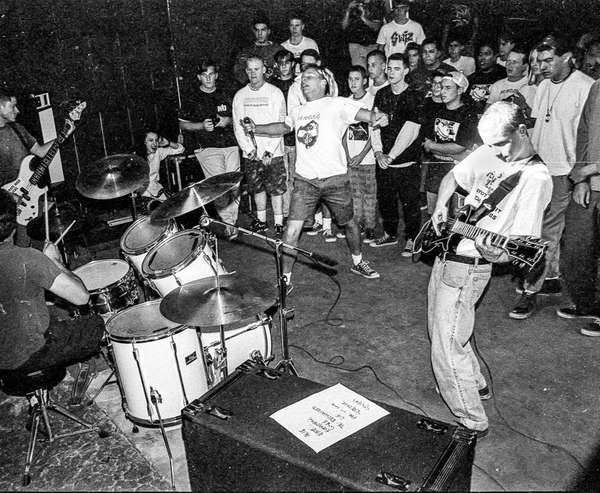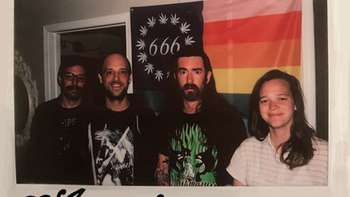Most musicians have day jobs – and not just to pay the bills. Jobs provide new challenges, personal fulfillment and, yes, some rent or gas money. And usually when somebody is writing a new record or scheduling a tour, they have to balance that with their job.
How an artist spends their time by day will influence the creative process at night. In Don’t Quit Your Day Job, Scene Point Blank looks at how musicians split their time, and how their careers influence their music or – sometimes – how their music provides escape.
In this edition, we chat with Kevin Doss of Downcast (vocals and guitar) and Los Angeles County Fire Department (paramedic and firefighter)
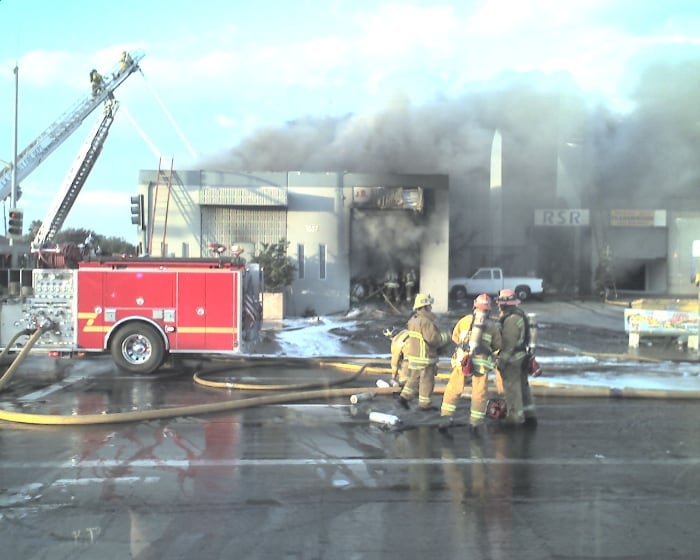
Scene Point Blank: First, what is your official job title and how long have you had it?
Kevin Doss: Firefighter Paramedic. 18 years.
Scene Point Blank: What is your general career path up 'til this point and how did you get where you are today?
Kevin Doss: My general career path is most likely to just keep doing what I’m doing. I’m lucky enough to work at a great firehouse in south-central Los Angeles and have been there for the last 14 years. I’m also involved with our training programs for the fire department where I train and teach new recruits on some of the basic and advanced portions of firefighting before they get out into the field.
Scene Point Blank: How does the timeline above overlap with Downcast (and playing music in general)? Were you already in bands when you started your career path? Did it influence your decision or timing in any way?
Kevin Doss: The two are completely separate. I basically felt like I needed to choose a career path after my first daughter was born in 1996 right after I did a summer tour with a band that I was in at the time called Born and Razed. I felt like I really needed to dedicate the time to being a good father and good provider for my family and continuing to play music the way we played it on such a DIY and non-commercial level just didn’t make sense anymore at the time. But now all of our kids are young adults which gives us more time to do things outside of our families like play music.
Scene Point Blank: You're a paramedic and firefighter. Were you one before the other, or are they always overlapping?
Kevin Doss: I was lucky enough to get hired by the Los Angeles County Fire Department as a firefighter and then they drafted me into paramedic training and trained me to be a paramedic. Many people have to go to paramedic school on their own time and on their own dime. I did not have to do either.
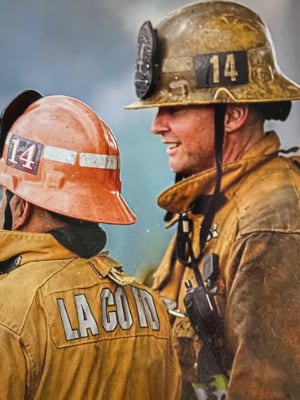 Scene Point Blank: What got you interested in the field?
Scene Point Blank: What got you interested in the field?
Kevin Doss: I had worked as a vegan cook in a co-op kitchen in Isla Vista and had started doing construction work to pay my rent and tuition while I was going to college, but it was always just trying to make a few bucks in between recording or practices or touring. When my daughter was born I faced a bit of a crisis. I didn’t wanna end up like my dad who hated his job, which had a very negative affect on him as a person and how he treated those around him.
My wife suggested that I look into firefighting because it is literally a profession where you go to work every day and the primary focus is to help people in need. That really works for me
Scene Point Blank: Firefighters everywhere face extreme challenges, but it seems that California faces unique circumstances with the threat of wildfires these days. Do you work with that, or are you mostly focused on urban LA concerns?
Kevin Doss: I have gone on brushfires before and I do work them occasionally but because of where I work is such a high impact area I pretty much just focus on the urban parts of the job. We go on a lot of medical calls: somewhere between 15 and 30 every 24-hour shift, and we go on shootings, stabbings, assaults, car accidents, etc. Not to mention the housefires and commercial building fires as well.
Scene Point Blank: Firefighters don't exactly work 9-to-5. In fact, I've talked with other musicians who picked the field because of the long shifts on/long shifts off dynamic (compared to a traditional M-F job). Does the job influence how Downcast operates -- meaning, does it directly affect how you write, rehearse, tour or record?
Kevin Doss: It was a difficult schedule to get used to at the beginning because we’re gone for 1 to 5 days at a time on a regular basis but that also affords us, generally speaking, a few days off in a row during the week or occasionally on a weekend. I feel like it allows me to be very productive at home whether that’s working on projects on my house, playing guitar, writing music or whatever.
Scene Point Blank: What's the biggest challenge in balancing work and creating art?
Kevin Doss: I think there’s a few challenges. Work generally takes a lot out of people. I work at a very busy firehouse where we don’t sleep very much. It’s not uncommon for me to get maybe six or seven hours sleep total over the course of three days. So when I come home I can be pretty exhausted. Trying to recover and be a conscious member of my family is my primary concern, but sometimes it’s hard to work through that exhaustion and try to do something creative as well.
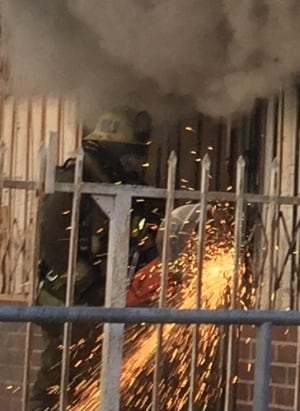 Scene Point Blank: Has the job ever directly affected a song? Are there any examples of this (drawing influence) in songs that you could point out?
Scene Point Blank: Has the job ever directly affected a song? Are there any examples of this (drawing influence) in songs that you could point out?
Kevin Doss: Definitely. I get exposed to and get to see a lot of things that occur in the underbelly of a pretty intense urban environment. It definitely affects the way I see the world which also affects the way I write and the things I choose to write about. The song “Mayday” on our record Tell Me I’m Alive is a pretty clear example of this.
Scene Point Blank: Does music ever come up with your coworkers or management? If so, how?
Kevin Doss: I was pretty good at keeping my music life separate from my professional life for a long time. But as I grew more comfortable in the department and felt like I could be more myself, it was only natural for me to share my music with some of my coworkers who are sometimes really good friends of mine. So occasionally while the guys are working out at the station or whatever they’ll throw a Downcast song in there just to mess with my head a little bit. It’s pretty odd hearing your music at work.
Scene Point Blank: Did you run into any challenges in your career path that were connected to your music, like awkward interview questions or stereotypes about musicians?
Kevin Doss: No. Not really. I just avoided the conversations in the beginning.
Scene Point Blank: Generally speaking, independent music is less theatrical (or maybe just lower budget) than mainstream rock. Meaning: maybe you don't play shows with bands that use pyrotechnics. Has your professional experience ever come up at a show or related setting?
Kevin Doss: No. Not yet. Thank goodness. That would mean something really bad was happening.
Scene Point Blank: What advice would you give to others who might be interested in a career as a firefighter or paramedic?
Kevin Doss: This is an interesting forum for this question. Generally speaking I think most people that are into punk or hardcore are usually anti-authoritarian and pretty independent minded. I definitely consider myself to be both of those. But I try to balance it with the opportunity that the department gives me to get out in the inner city and help people on a daily basis. And the fact that I get a paycheck from it doesn’t hurt either.
I’d say if you’re pretty physically fit, mentally stable enough to handle seeing a lot of trauma, like working as a team and have no problem being a public servant, a firefighter career might be something worth looking into.
Check out previous entries in the Don’t Quit Your Day Job series.
